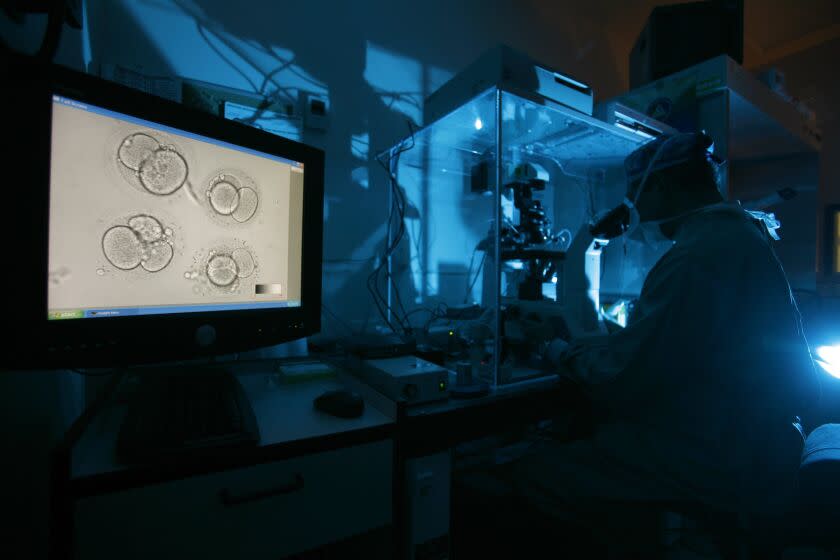An L.A. couple's embryos were destroyed by toxic oil — and others could be at risk, lawsuit alleges

A Los Angeles couple filed a lawsuit Thursday against a maker of a crucial oil used by fertility clinics, saying it was toxic and destroyed their embryos.
Fujifilm Irvine Scientific quietly recalled four production lots of the oil, used to culture embryos, on Jan. 16 after complaints of problems from clinics and an internal investigation.
The couple’s lawyers said that the embryos of more fertility patients may have been destroyed. The Orange County company is a major global supplier of the refined mineral oil used in the process of in vitro fertilization.
In its recall notice to fertility clinics, the company said it had received “a small number” of complaints, which included the “complete degradation” of some embryos. The company did not post the letter on its website or alert the broader public to the problems.
The company said it had performed “an extensive investigation” after receiving the complaints. Although the oil product had met its specifications before it was shipped, the company said, its investigation detected toxicity in three of the lots.
The company said it was also recalling a fourth lot because it was made from the same batch of raw materials.
“It is important that these devices are not used,” Marlin Frechette, the company’s chief compliance and quality officer, wrote in the notice.
The couple, who were not identified by name, said in the lawsuit that their fertility clinic notified them shortly after the Jan. 16 notice to say that the oil had destroyed their nine embryos. They said they were devastated because they may no longer be able to have genetic children.
They were referred to only as “A.B.” and “C.D.” in the lawsuit, which was filed in Orange County Superior Court.
Joe Metzger, a spokesman for Fujifilm Irvine Scientific, said in a statement Thursday afternoon that “many factors may influence the success of IVF procedures.”
The company “promptly initiated a comprehensive investigation” after receiving the complaints, he said. And it recalled the four lots “out of an abundance of caution.”
“We will respond to legal claims in the legal process,” Metzger said.
In promotional materials, Fujifilm Irvine Scientific described the mineral oil as “highly purified” and said it could safely be used to prevent evaporation in the delicate process of culturing and storing embryos, according to the lawsuit.
The lawsuit alleges the company failed to properly test the oil before distributing it.
“Only Fujifilm Irvine Scientific knows exactly what was in its oil that made it toxic,” said Adam Wolf, one of the lawyers who filed the lawsuit.
Wolf said one fertility clinic had tested the recalled oil on mouse embryos to see if it was toxic. The mouse embryos were destroyed, he said.
He said the company’s failure to quickly publicize the recall was outrageous and could have resulted in more embryos needlessly being destroyed.
The global holding company Fujifilm, which is headquartered in Tokyo, bought Irvine Scientific Sales Co. in Santa Ana in 2018.
This story originally appeared in Los Angeles Times.

 Yahoo Finance
Yahoo Finance 